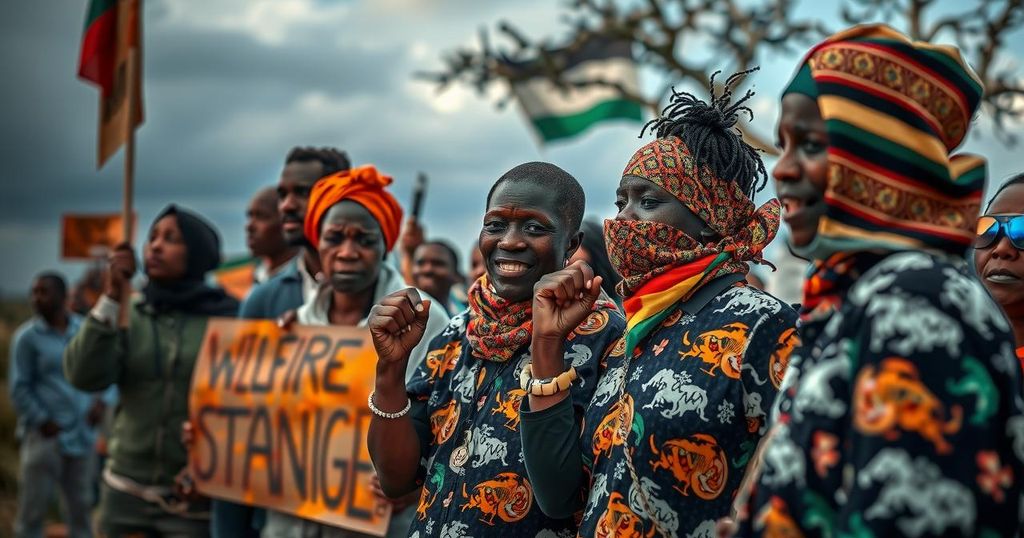A coalition of conservation groups strongly opposes Namibia and Zimbabwe’s plans to cull elephants and other wildlife, arguing that such actions threaten endangered species, exacerbate human-wildlife conflict, and undermine tourism. They call for sustainable and humane alternatives to address drought-related challenges in these nations instead of resorting to indiscriminate killings.
A coalition of animal welfare and conservation organizations, including World Animal News, Peace 4 Animals, Born Free USA, and the Born Free Foundation, has expressed grave concern regarding recent plans announced by Namibia and Zimbabwe to cull significant numbers of wild animals, particularly elephants, citing unsustainable and harmful practices that jeopardize both wildlife and ecosystems. In August 2024, Namibia revealed intentions to kill 723 wild animals, a figure that subsequently escalated to 1,002, including 83 elephants. Following suit, Zimbabwe also announced its plans to cull at least 200 elephants. The rationale provided for these drastic measures centers on addressing human-wildlife conflict, food scarcity, and resource pressure due to severe drought conditions. However, the organizations argue these justifications disguise the dire implications of large-scale wildlife killings. Instead of alleviating the hardships faced by drought-affected communities, the coalition suggests that culling undermines food security and could exacerbate human-wildlife conflict. They emphasize that mass killings threaten the social structures of wildlife populations, disrupt ecosystems, and can provoke increased aggression from surviving animals towards humans. Furthermore, elephant culling fuels ivory trafficking, raising international bans on ivory trade, which could have catastrophic consequences for remaining elephants and conservation efforts. Animal protection groups also highlight the economic impact of culling on tourism, a vital sector in Zimbabwe, where wildlife tourism is the third-largest contributor to GDP. The killing of iconic animals like elephants may deter tourists and impact local livelihoods dependent on a thriving ecosystem. This policy reversal recalls similar practices from the mid-20th century, which faced widespread condemnation due to the cruelty involved. It must also be acknowledged that savanna elephants are categorized as Endangered, having experienced a significant decline of 60% across their range over the past 50 years. Claims of overpopulation in southern Africa lack scientific support, as research indicates that populations have not significantly increased since 2014. In light of the current drought, which poses challenges for both humans and wildlife, it is crucial for the governments involved to seek alternative solutions rather than resorting to culling. Experts advocate for distributing staple foods, such as grains, and implementing effective measures for human-wildlife coexistence, rather than resorting to indiscriminate killings that compromise wildlife populations. The coalition strongly urges the Namibian and Zimbabwean governments to revoke their culling plans and pivot towards sustainable and humane alternatives. It is imperative that donor nations and agencies also link aid to the development and execution of measures that foster food security while ensuring the preservation of endangered wildlife species. Efforts that prioritize humane treatment and conservation over financial gain must be at the forefront of discussions surrounding drought responses.
The recent announcements by Namibia and Zimbabwe to cull significant numbers of elephants and other wild animals have triggered a backlash from various animal protection and conservation groups. While these nations cite extreme drought conditions and resource management as motives for their drastic measures, experts and organizations in the field emphasize the unsustainability and ethical concerns surrounding such actions. The ongoing crisis highlights the need for effective strategies that protect both human livelihood and wildlife, particularly in light of complexities involved in human-wildlife interactions and the conservation status of endangered species.
In conclusion, the coalition of animal protection and conservation organizations adamantly opposes the proposed wildlife culls in Namibia and Zimbabwe, advocating for sustainable alternatives that prioritize the well-being of both humans and wildlife. Large-scale killings not only threaten vulnerable animal populations and ecosystems but also undermine economic growth in tourism-dependent regions. Moving forward, it is critical for governments to explore compassionate solutions that reflect a commitment to both animal conservation and community welfare.
Original Source: www.zawya.com







